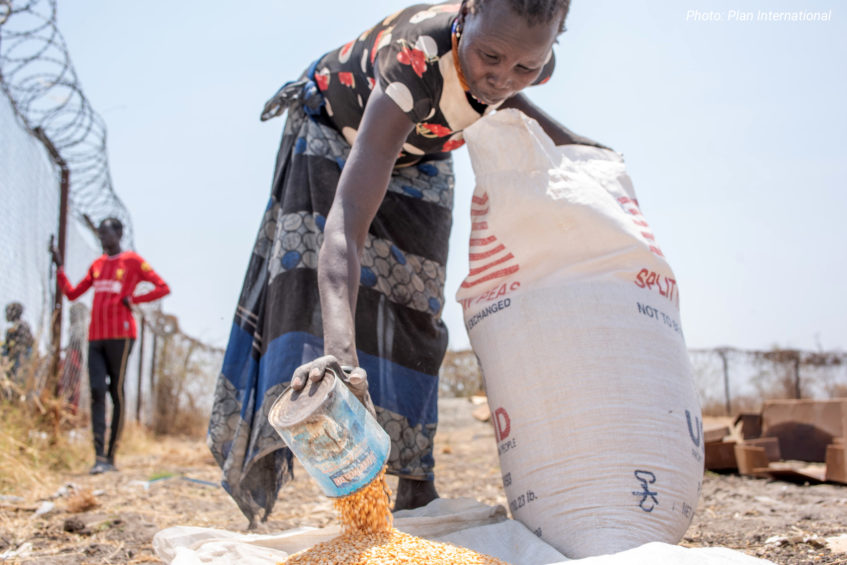You are here: Home | Economy | Humanitarian | News | U.S. urges South Sudan government to ‘prioritize the needs’ of citizens

A South Sudanese woman receiving food provided by Humanitarian organizations in South Sudan - Credit: UNOCHA
The U.S. has appealed to the South Sudan government to prioritize the needs of its citizens by addressing insecurities and drivers of sub-national violence.
William Flens, the US Embassy Chargé d’Affaires in Juba said the new funding by his country will not be a permanent solution to the suffering of millions in the country.
“From my travels across this beautiful country, I have heard from ordinary people about how they are struggling more than ever to make a living or to feed their families. It shouldn’t be the case, South Sudan is a rich country,” Flens stated.
Since independence, the country has witnessed the worst food crisis due to conflict, persistent floods, drought and the impact of global food and fuel crisis.
Last week, the United States government committed $223 to WFP, which it said will save the lives of millions of starving South Sudanese.
Washington, through its development agency USAID, said the first phase of the funding will deliver immediate support to over 2 million severely food insecure women, children and men in the country.
The finance will be channeled to WFP to provide lifesaving food and nutrition assistance and cash transfer.
In addition, the second phase of the contribution, due to arrive by the end of this year, will provide WFP with in-kind food assistance worth of 117 million US dollars.
This include, sorghum, vegetable oil and nutritious food for infants under five years of age and expectant mothers.
“This contribution is so timely. It will save lives at a time when most of the vulnerable people in South Sudan are struggling just to get by day to day,” said Mr. Flens.
South Sudan continues to face a dire humanitarian situation with more than half its population already facing food insecurity situation.
Over 7 million people at at the verge of severe acute food insecurity in Fangak, Pigi and Ayod counties of Jonglei State between April and July, according to the Integrated Food Security Phase Classification report.
Other areas of the same category include Pibor Administrative Area, Cueibet and Rumbek North counties of Lakes State, as well as Leer and Mayendit counties of Unity State.
The report further adds that food insecurity in South Sudan is driven by multiple shocks, including climatic conditions such as floods, dry spells and droughts.
Others include insecurity caused by sub-national and localized violence, population displacements, persistent annual cereal deficits, diseases and pests.
The IPC report also said economic crisis, the effects of COVID-19, limited access to basic services, and the cumulative effects of prolonged years of asset depletion that continue to erode households’ coping capacities were among the reasons.
For her part, the Vice President for Gender, Youth and Humanitarian Cluster Rebecca Nyadeng welcomed the US support to disadvantage families in South Sudan.
Nyadeng, however urged the US government and development partners to support the national food system to reduce dependence on humanitarian assistance.
“We must also work together on long term solution to reduce dependence on humanitarian assistance while addressing the immediate need or need of the most vulnerable,” said the vice president.
“We should also reflect on what we must do together to strengthen the resilience of the people of South Sudan. Boosting agricultural production and strengthening national food system particularly at a time of crisis,” she added.
South Sudan has millions of hectares of arable land, with over 70 percent considered suitable for agriculture.
However, only 4 percent of the agricultural land has been put to use.
Crops production levels in the country reportedly declined in 2016, due to displacement of farmers in different parts of the country.
This year alone, U.S. has so donated approximately $1 billion for humanitarian and development aid to South Sudan.
The Food and Agriculture Organization, of the United Nations believes that Western Equatoria is the only state that was able to produce its own food for the last conservative years.
Diplomat William Flens suggested that it is the primarily responsibility of the South Sudan authorities to address the drivers of sub-national violence.
“We continue to provide significant assistance to save lives and reduce the suffering of the people of South Sudan.., and we continue to urge the government of South Sudan to address the drivers of sub-national violence that contributes to the humanitarian crisis.”
South Sudan Humanitarian snapshot for June indicated that high levels of food insecurity, inter-communal violence, cattle raids and disease outbreaks continue to affect many people in the country.
Vice President Rebecca Nyadeng, however, assured the international community and the citizens of her government’s commitment to address insecurity facing some parties of the country.
“We have to exert our effort to realize that South Sudan has the biggest organic [fertile] land and organic farm but our problem is insecurity but we are going to work as the government to eradicate that,” she said.
In June this year, the World Food Program suspended food assistance to South Sudan due to insufficient funding.
The UN food agency said it had exhausted all options before suspending food assistance, including halving rations in 2021, leaving families in need with less food to eat.
First Vice President Dr. Riek Machar, said addressing the challenges facing local population require joint effort by the international community and the government.
Dr. Riek Machar added that this can be achieved if the 2018 peace deal is fully implemented.
The US government remains the largest donor of humanitarian assistance to South Sudan, providing around a billion each year for food assistance, safe drinking water, health services, emergency education and shelter support.
Support Eye Radio, the first independent radio broadcaster of news, information & entertainment in South Sudan.
Make a monthly or a one off contribution.
Copyright 2024. All rights reserved. Eye Radio is a product of Eye Media Limited.